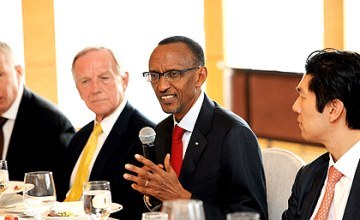President Kagame yesterday addressed students at Peking University, which is believed to be one of the oldest Universities in China.

Professor Justin Lin, a former World Bank chief economist and author of "The Quest for Prosperity", welcomed the President by reflecting on his visit to Rwanda.
"I was very inspired by the development in Rwanda and moved by the enthusiasm of its citizens for their future and the motivation the government to serve the people. I am convinced that if Taiwan can do it, China can do it, and Rwanda can also change from a low income nation to a high income one within one to two generations. President Kagame is the man who can make it happen."
President Kagame gave a historical perspective of the relationship between China and Africa dating back to the 15th century by describing three phases, beginning with the 15th century trade with Malindi, followed by China's support for decolonization of multiple African countries and leading up to the third and current phase.
"It has never been about subjugation. Instead, China-Africa relations have been about cooperation."
Kagame added that this did not mean that both nations always agreed on everything, but rather there was a foundation upon which to further refine a mutually beneficial relationship.
Sharing his views on aid with the students, President Kagame said: "Aid has perpetuated dependency...unless aid aims to enhance individual and institutional capacity, it will not work. We need investments that promote entrepreneurship and innovation from within and from outside our continent. With China and Africa making up 1/3 of the population and a commitment towards collaboration from all involved parties, the opportunity for mutually beneficial partnership is unquestionable."
The students were then given a chance to ask President Kagame questions. One student asked him how Rwanda balanced donor conditionalities with the resolve to own its development.
"For a country to develop, people will have to take ownership of that process of development, no one is going to hand it to you. We must challenge ourselves and also challenge others. We appreciate the help from outside but we must lead our process. We have seen it work in multiple areas including agriculture," the President answered.
They also wanted to know about the current relationship with international organizations, particularly the World Bank. President Kagame recognised the progress made by many institutions in changing traditional operating procedures.
He explained that Rwanda's stance on organizations was based on its history of witnessing how much had been spent with very few recognizable results.
"In Rwanda, our system, without spending so much, has achieved so much more than other institutions who claim to support our processes," President Kagame explained. However, he also recognized a change in the way the World Bank had begun to do business.
"People have learned that to be helpful they must listen to needs and to new ideas of how things can be done differently".
Source: All Africa
Edited by: Arthars